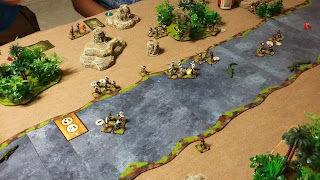In this scenario the companies were to rush across the table, gathering a flag from the river along the way, then pass from exit points on the opposite edge. Each exit point could only be used once.
As with all Congo scenarios alacrity is key. You must hustle from turn one to complete your objective. In this game no one would complete theirs. Interference by the opposition slowed the passage of all units across the table and the accumulation of stress token further slowed progress.
Two players played on each side - Bill and Michael represented the Smut Expedition while Ian and Jason were the Banks Expedition. Players deployed along the long edge (within a S (small) measuring stick)) and took turns to place units.
The card system is one of the things I most admire about this game and the confusion special rule only added to its charm. Each player drew three command cards and could either keep these cards, gaining themselves an additional totem card, or discard and redraw a single card. All players took the extra totem option hoping for bonuses that could gain them some advantage.
We played the Confusion special rule for three turns (perhaps too many?) before reverting to the usual method of choosing the three command cards you wish to use from the seven available. You then choose the order in which these are played. You and your opponent place each of your three cards down in turn - at the same time - and the initiative number on the card decides who will take their actions first - either move, shoot or rally/terror. Totem cards modify these actions in a beneficial way.
By turn 3 and 4, units from both sides plunged into the river - more from the Bank's Expedition - in order to attain the flags. The Smut party seemed to be waiting to set upon the enemy as they emerged with the flags although this may be crediting them with more planning than was deserved - perhaps not but I'll give them the benefit of the doubt.
Note the swarthy fellows carrying tusks and boxes - these are bearers and we used them for the first time finding them effecting for soaking up a bullet and warding off the effects of movement stress tokens.
Bank's men take the lead by seizing two flags but are swarmed by crocodilian defenders of the Nziari.
By Turn 4 onwards both expeditions were ready to come to blows and the crack of firearms was heard resounding through the jungle/savannah. Units which waded into the Nziari then had to face the risk of crocodile attack. These creatures swarmed from the banks and dragged several askari under before disappearing as quickly as they had arisen.
By Turn 5 the Bank's Expedition units were clambering from the Nziari only to be greeted by an awaiting askari swarm. The Bank's units were of higher quality by the dice gods of Africa decreed a different outcome. Several volleys from these barely trained combatants cut a swathe through the enemy. Two units died and one flag (a scenario objective) was lost. This was quickly scooped up but this took precious time. Dice were also favourable to Smut's men in combat where further casualties were inflicted.
The highly vaunted German marines and Banks himself were all victims of lowly askari - under the direction of the experienced Smut.
The last two images show the final turn. With stress tokens piling up, their own attacks failing and lesser opponents 'punching above their weight', what looked like victory seemed to be slipping away. The dreaded 'red hand' stress token crippled the soldiers in the final moments of the game - this sees stress so grip the unit that no further action is permissible in that turn. This certainly sped their doom.
The final result was a victory to the Smut party although, as jungle-master running the scenario, I did neglect to tell the Banks players they could move a unit out of the river with a flag to gain five more victory points which would have seen a narrow one point victory margin to them.
In short, Congo works. Interesting command decisions and pressures are certainly a major reason for this. Movement, shooting, combat and morale are simply yet effective and logical. We didn't get to play the second scenario but all certainly seemed to enjoy many parts of the one we did play.
We will be returning to the .... Congo!


















No comments:
Post a Comment